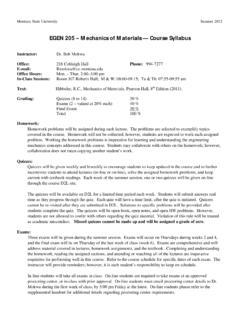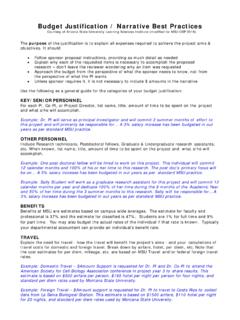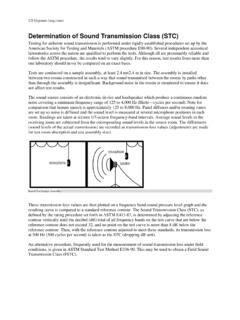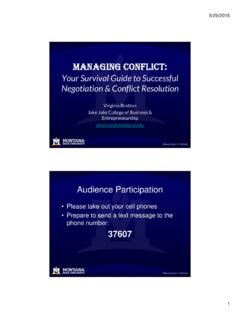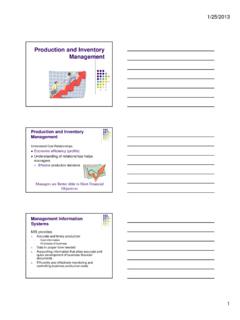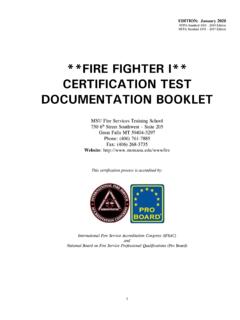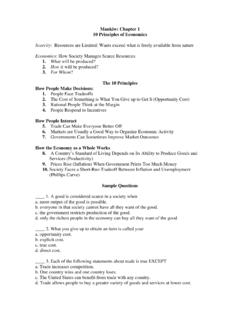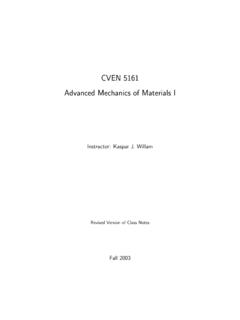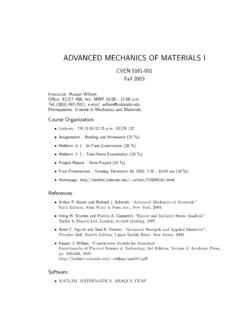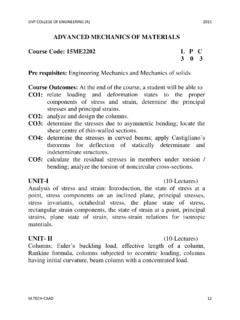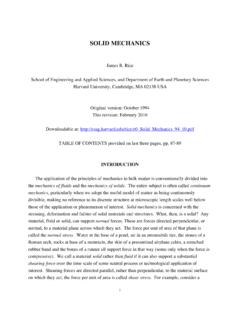Transcription of EMEC 341: Advanced Mechanics of Materials - montana.edu
1 EMEC 341: Advanced Mechanics of Materials Spring 2018. montana State University Department of Mechanical Engineering Lecture: TR 12:15-1:30 pm Reid 101. Instructors Dr. Erick Johnson 201E Roberts Hall (406) 994-6163. OFFICE HOURS: See schedule posted on D2L. If you can't meet during scheduled office hours email me to discuss the issue and/or setup an appointment. Catalog Description: Static yield theories, introduction to fracture Mechanics , analysis of fatigue, thick-walled pressure vessels, strain energy, Castigliano's theorem, application to engineering design analysis problems. 3cr. Pre-requisites: EGEN 205 and M274.
2 Co-requisites: Concurrent enrollment in or prior completion of ETME 217 and EGEN 350. Textbook: Boresi and Schmidt Advanced Mechanics of Materials ,6th ed., 2003, John Wiley & Sons, Inc., ISBN: 978-0-471-43881-6. Computer and Laboratory Usage: Students may be required to complete several homework assignments using MATLAB or equivalent software. In addition to department-provided access to computers and the software, the following packages are available for installation on personally-owned devices as well. MATLAB: Mathematica: Course Learning Outcomes: Through the topics identified in the Course Description, the student will enhance problem solving skills by undertaking problems that are less-clearly stated, more open ended, and for which the mechanism/location that limits the design is not immediately obvious.
3 More specific outcomes include: 1. 1. Apply previously gained knowledge of mathematics, science and engineering to develop a working understanding of introductory machine design topics. 2. Learn the key failure processes and mechanisms that must be employed throughout the process of machine design. 3. Develop the ability to work in teams to learn concepts and solve complex engineering problems related to machine design. 4. Continue to develop the skill of engineering judgment while solving problems related to machine design. 5. Develop an understanding for the need of lifelong learning. Assessment and Evaluation The course objectives will be evaluated on the following criteria: Homework 7%.
4 Quizzes and in-class assignments 18%. In-class exams x3 75% (25% each). Cumulative final exam Optional (if taken, replaces lowest mid-term exam). The instructor reserves the right to add up to 5 points to a student's final average if the instructor does not believe the average accurately reflects the student's overall performance in the class. Quality performance on assignments and class participation is a necessary, but not sufficient, condition for this action to be taken. HOMEWORK: Suggested problems will be announced for each topic throughout the semester on D2L. You are strongly encouraged to complete the suggested problems to help you learn the material and ensure your understanding.
5 Office hours provide a great opportunity to ask questions about these problems to provide you with a better understanding of the topics, which will help prepare you for quizzes, exams, and implementing the topics in engineering design and analysis beyond this class. EXAMS: There will be three midterm exams that will take place during previously scheduled common-hour times and a final exam administered according to the University schedule. Make up exams will only be given in the case of a documented medical absence (with a doctor's note on office letterhead), or for family/personal emergencies (with a note from the relevant MSU academic advisor).
6 If you anticipate a conflict with the time of a scheduled exam, please contact me well in advance for alternate arrangements. QUIZZES AND IN-CLASS ASSIGNMENTS: Quizzes will be given in class on a regular basis. The quizzes may cover conceptual and/or content covered in the suggested homework problems. No make- up quizzes will be given. RE-GRADE POLICY: If you feel that an exam or assignment was graded incorrectly, please return the work along with a neatly written/typed note attached that clearly describes what you believe to be the grading error within one week of receiving the original grade. The instructor will then look over the problem(s) that you believe have an error, as well as the rest of the assignment, and adjust your grade accordingly.
7 2. Behavioral Expectations ACADEMIC MISCONDUCT: Students are reminded that academic misconduct is a violation of the MSU Student Code of Conduct. Section 420 of the Student Conduct Code describes academic misconduct as including but not limited to plagiarism, cheating, multiple submissions, or facilitating others' misconduct. Possible sanctions for academic misconduct range from an oral reprimand to expulsion from the university. Mechanical and Industrial Engineering Department policy mandates that course instructors report any and all cases of academic misconduct. ACADEMIC EXPECTATIONS: Section in the MSU Conduct Guidelines states that students must: A.
8 Be prompt and regular in attending classes;. B. be well prepared for classes;. C. submit required assignments in a timely manner;. D. take exams when scheduled;. E. act in a respectful manner toward other students and the instructor and in a way that does not detract from the learning experience; and F. make and keep appointments when necessary to meet with the instructor. In addition to the above items, students are expected to meet any additional course and behavioral standards as defined by the instructor. STUDENT CONDUCT: This class is fortunate to have the support of a graduate student teaching assistant (GTA) to assist and facilitate with student learning.
9 This GTA should be treated with respect and all interactions should be professional. The MSU Student Code of Conduct ( ) requires this of all students. Violations of this policy with a GTA (or anyone else) will not be tolerated and will be handled according to the procedures described in the policy. GTAs have very specific assignments from the course instructor and therefore may not have comprehensive knowledge of all course requirements and content. If questions arise requiring clarification of class content or subject material , please direct them to the course instructor. In their instruction role, the GTAs may be responsible for assigning grades.
10 If a student disagrees with the decision made by the GTA then they are to bring that concern directly to the course instructor and not challenge the GTA regarding their decision. COLLABORATION: University policy states that, unless otherwise specified, students may not collaborate on graded material . However, this class will utilize team projects and assignments throughout the semester. It is required that all students will participate in assigned teaming activities. Any difficulties experienced through the teaming process must be brought to the instructor immediately. Delayed complaints and issues on team assignments leave the instructor with little latitude for altering outcomes.
